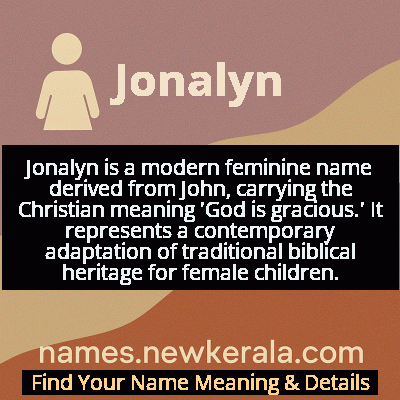Jonalyn Name Meaning & Details
Origin, Popularity, Numerology Analysis & Name Meaning of Jonalyn
Discover the origin, meaning, and cultural significance of the name JONALYN. Delve into its historical roots and explore the lasting impact it has had on communities and traditions.
Name
Jonalyn
Gender
Female
Origin
Christian
Lucky Number
1
Meaning of the Name - Jonalyn
Jonalyn is a modern feminine name derived from John, carrying the Christian meaning 'God is gracious.' It represents a contemporary adaptation of traditional biblical heritage for female children.
Jonalyn - Complete Numerology Analysis
Your Numerology Number
Based on Pythagorean Numerology System
Ruling Planet
Sun
Positive Nature
Leaders, ambitious, highly driven, self-reliant, innovative.
Negative Traits
Overly aggressive, domineering, impatient, selfish.
Lucky Colours
Red, orange, gold.
Lucky Days
Sunday.
Lucky Stones
Ruby, garnet.
Harmony Numbers
2, 3, 9.
Best Suited Professions
Entrepreneurs, managers, engineers.
What People Like About You
Courage, determination, leadership.
Famous People Named Jonalyn
Jonalyn Viray
Singer
Award-winning Filipino pop singer and television personality
Jonalyn Codia
Beauty Queen
Represented Philippines in international beauty pageants
Jonalyn Soria
Athlete
Professional volleyball player in Philippine leagues
Name Variations & International Equivalents
Click on blue names to explore their detailed meanings. Gray names with will be available soon.
Cultural & Historical Significance
The cultural significance of Jonalyn extends beyond its religious roots to represent how naming traditions evolve in multicultural contexts. In Filipino communities, the name exemplifies the blending of Western Christian traditions with local naming preferences, creating names that feel both familiar and distinctive. The name's structure—combining the traditional 'Jon' root with the feminine '-lyn' suffix—follows patterns seen in other successful name creations that have become established in their own right. This demonstrates how names can serve as cultural artifacts, recording historical influences, religious values, and social trends within their simple structures.
Extended Personality Analysis
Women named Jonalyn are often characterized by their gracious and compassionate nature, living up to the name's meaning of 'God is gracious.' They typically possess a warm, approachable demeanor that makes others feel comfortable and valued. This innate kindness is balanced with practical intelligence and resilience, allowing them to navigate life's challenges with both heart and wisdom. Jonalyns tend to be natural caregivers who excel in creating harmonious environments, whether in their families, workplaces, or communities.
Their personality often combines traditional values with modern adaptability, making them effective bridges between different generations or cultural perspectives. They're frequently described as having quiet strength—they don't need to be the center of attention but possess considerable inner fortitude. Many Jonalyns demonstrate excellent communication skills, particularly in mediating conflicts or explaining complex ideas with clarity and patience. Their creative problem-solving abilities often surprise those who initially perceive them as conventional, revealing depth and innovation beneath their gracious exterior. This combination of traditional warmth and contemporary capability makes Jonalyns valued members of any community they join.
Modern Usage & Popularity
In contemporary naming practices, Jonalyn maintains moderate but steady usage, primarily within Christian communities and Filipino families worldwide. The name peaked in popularity during the 1990s and early 2000s, coinciding with broader trends of creating feminine versions of traditional names and the rising influence of Filipino naming patterns in global contexts. While it doesn't typically appear in top name lists in English-speaking countries, it remains a meaningful choice for parents seeking a name that balances religious significance with modern appeal. The name's usage reflects ongoing cultural exchanges, particularly between Western Christian traditions and Asian naming practices, creating a name that feels both familiar and distinctive across different communities. Recent years have seen some decline as naming trends shift toward shorter, more minimalist options, but Jonalyn continues to be chosen by parents who value its melodic quality and the way it honors biblical heritage while feeling fresh and contemporary.
Symbolic & Spiritual Meanings
Symbolically, Jonalyn represents the graceful integration of spiritual heritage with modern feminine identity. The name carries deep metaphorical significance as a bridge between traditional faith and contemporary expression, embodying how ancient spiritual truths can find new life in modern contexts. The 'Jon' root connects to concepts of divine favor and covenant relationship, while the '-lyn' suffix adds layers of feminine grace, beauty, and lyrical quality. Together, they create a symbolic representation of blessed womanhood—strength that is gentle, faith that is personal, and grace that is actively expressed in daily life. The name metaphorically suggests someone who carries forward spiritual traditions while adapting them to current realities, making them relevant and meaningful for new generations. It symbolizes the idea that faith and femininity are not contradictory but beautifully complementary, with each enhancing the other's depth and expression.

